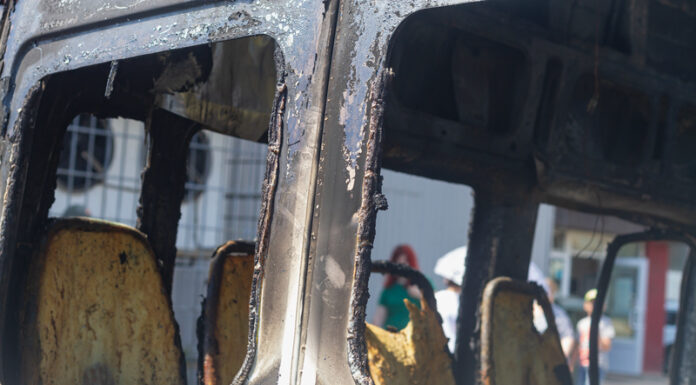In a tragic incident in suburban Bangkok on Tuesday, October 1, a school bus carrying students and teachers on a field trip ignited, leading to at least 23 fatalities, according to official reports. The event took place in Pathum Thani province, a northern suburb of Thailand’s capital.
Acting police commissioner Kitrat Phanphet revealed that the bus was ferrying 45 passengers, comprising 39 elementary and junior high school students along with six teachers, from Uthai Thani province to Bangkok. The fire was reported close to noon and was doused within an hour.
Preliminary investigations suggested that the fire began following a tire explosion, which led to sparks igniting the natural gas-powered vehicle. The intense heat within the bus hampered rescue efforts and posed the risk of additional explosions.
Rescuer Piyalak Thinkaew from the Ruam Katanyu Foundation shared that most of the bodies were located in the middle and back seats of the bus, leading rescuers to deduce that the fire had started at the front of the bus, prompting passengers to move towards the rear.
Identification of all victims is still ongoing by the authorities. Three teachers and 20 students are still unaccounted for, with 16 students receiving treatment for minor injuries. Three girls, including one with severe burns to her face, mouth, and eyes, were initially hospitalized.
Following the incident, the bus driver reportedly abandoned the scene. The bus company could face charges if found culpable of negligence.
Prime Minister Paetongtarn Shinawatra conveyed her condolences and assured government support for the families of the victims. The government has vowed to bear all medical expenses and provide compensation to those affected by this unfortunate event.
This incident has sparked debate about the safety of long-distance student transportation in Thailand. The nation’s roads are infamous for their high rates of traffic accidents and fatalities. The World Health Organization estimates that approximately 20,000 people lose their lives and one million sustain injuries in road accidents in Thailand each year.
Thailand’s Transport Minister, Suriyahe Juangroongruangkit, expressed concerns about the use of compressed natural gas in passenger vehicles, calling it “extremely risky.” He proposed that future measures should consider banning such vehicles.
The Institute of Forensic Medicine is in the process of identifying the victims using DNA analysis. Concurrently, the Ministry of Public Health has dispatched teams to provide psychological support to the bereaved families.
Investigators later discovered that the bus, which had been adapted to operate on compressed natural gas (CNG), contained six gas cylinders that were lawfully installed at the rear. However, they also uncovered five additional cylinders that were unlawfully placed under the front of the bus.
The probe revealed that a pipe connected to one of the front cylinders broke upon impact, resulting in a gas leak that sparked the fire. It seems the trapped passengers also could not access the rear emergency exit, though the reason for this is still unknown.
In reaction to these findings, the government mandated inspections for all CNG-powered buses—over 13,000 in total—and suspended all long-distance school bus services.








